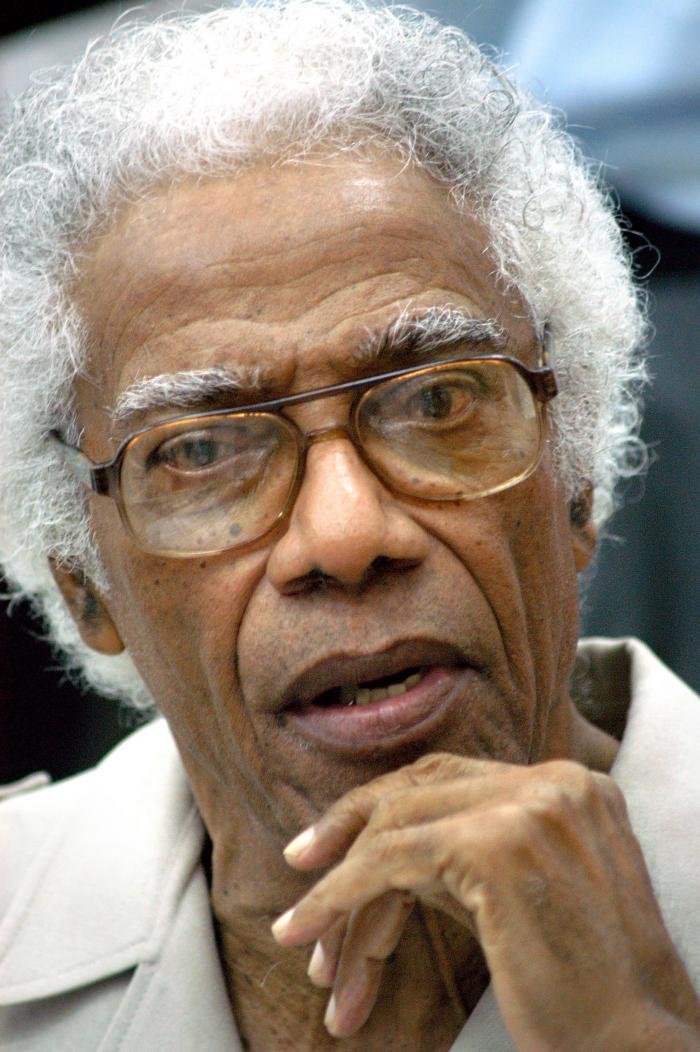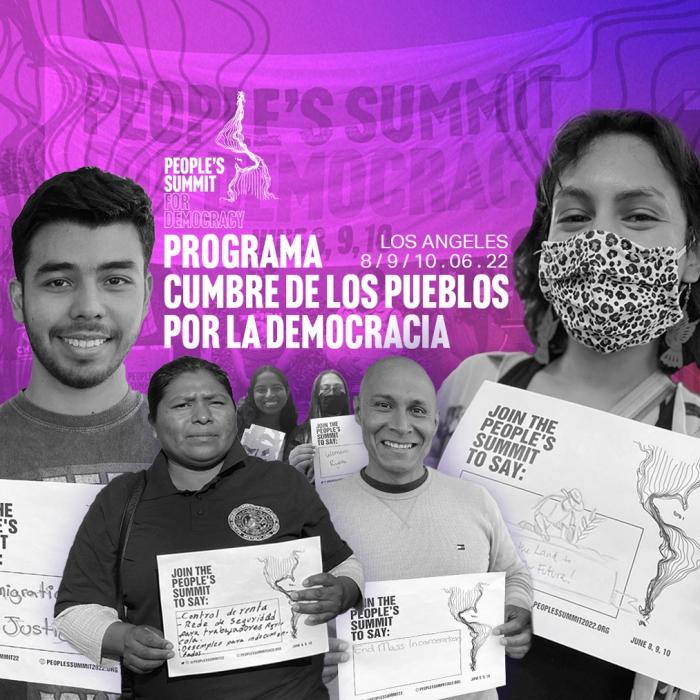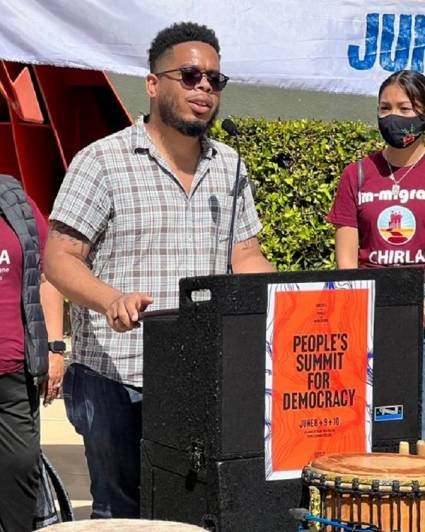June 2022 8
Nancy Morejón: Regarding George Lamming

Regarding George Lamming
Translated and edited by Walter Lippmann for CubaNews.

George Lamming (1927-2022), the great writer, dean of the narrators and thinkers of the English-speaking Caribbean, has just died on the island of Barbados, his native land. It would seem that the torrential waters of the beginning of June wanted to put an end to his long and immense life experience and, also, to his exceptional literary production, which began with indisputable resonance in 1953, when his classic novel En el castillo de mi piel [In the Castle of My Skin] appeared, translated by María Teresa Ortega and prologued by Emilio Jorge Rodríguez, and splendidly integrated the editorial catalog of Casa de las Américas (1979), in its prestigious collection dedicated to Latin American literature, which included titles by authors such as the Brazilian Guimaraes Rosa, the Jamaican Roger Mais and the Paraguayan Augusto Roa Bastos.
In the years he served as an advisor to the Casa’s Center for Caribbean Studies, I learned from his erudition and his conscience, which went hand in hand. His sense of regional integration went beyond vested, economic or even personal interests. He was a good conversationalist, a spontaneous communicator. I once heard him say: “In the Caribbean, there is always a ship arriving or leaving. And also: “The best economists of our archipelagos are the housewives… that is to say, the humble women; I admire them, I love them because they put their ancestral magic into practice”.
Lamming belonged to a type of intellectual with a high sense of the function of literature and the arts as vehicles of communication and recognition of the plural identity that defines the multicultural character of the region. It was not by chance that he was part of the New World group that defended the right to avant-garde art, although never detached from a morality at the service of a more advanced, more independent and better world. With enormous rigor and a proverbial literary excellence, his stories, his novels, transpire the yearning for freedom and regional integration in a frank struggle against colonial oppression that, in his pages, also acquires a continental vocation that we still need to understand today.
He wrote books that we will never be able to do without again, and although fiction is the key to his literary experience, the truth is that he reflected and compiled a sum of allegories, reasonings and debates on exile that are today a school, a method and, thus, a call to the indomitable being of Caribbean people throughout all the archipelagos. London and Georgetown were put in their rightful place. That is the grace and intellectual restlessness that reigns in The Pleasures of Exile (1960), whose lesson Roberto Fernandez Retamar revered in his also classic essay Caliban (1979).
George Lamming is and will continue to be -like Wilson Harris, Vic Reid, Derek Walcott, among others, including the extraordinary musician popularly known as Mighty Sparrow- a sacred patriarch of our culture, especially when the popular is installed, by its own right, in the impassable place where the most legitimate flags of independence fly forever.
A weekend amid shootings and price hikes

A weekend amid shootings and price hikes
Things are not going well in the U.S. for the citizens who will vote in November. Pocketbooks are being ripped out, while schools, hospitals, religious institutions and even funerals are being targeted by shooters.
Author:

Juana Carrasco Martín | juana@juventudrebelde.cu
Translated and edited by Walter Lippmann for CubaNews.

Gasoline in Los Angeles. Author: Taken from Antiwar.com Published: 04/06/2022 | 09:11 pm
In Los Angeles, the host city in a few days of the Summit without the Americas, as many have labeled it because of the selective exclusion decreed by President Joseph Biden to three sovereign nations in the region, the price of fuel at a downtown gas station reached more than eight dollars a gallon and prices continued to rise throughout the United States.
Meanwhile, the price of a barrel of crude oil in the European market closed at $117.60, its highest price since March 23, and much had to do with the sanctions imposed on Russian exports due to Washington and NATO’s confrontation with the Kremlin and the war situation in Ukraine.
Crude oil costs account for just over half of the pump price, according to the U.S. Energy Information Administration. The rest of the price includes the other components of gasoline, production costs, distribution costs, overhead costs for everyone involved in production, distribution and sales, taxes and California carbon offset fees paid by refineries, City News Service said in releasing the increase that hits Americans’ pocketbooks hard.
The national average price of gasoline rose to a record high of $4.62 dollars, and it is no secret that this increase directly affects the cost of food, and a wide range of goods and services, so it has not been the only product that continues to rise.
The New York Times warned at the beginning of May that “the era of abundant cheap products could be coming to an end”, and went back to the pandemic in search of the causes. This is because, since then, the supply of goods has been severely limited and, consequently, prices have risen, with the aggravating factor that economists warn that this situation could persist, when the COVID-19 and the war in Ukraine affect international trade and inventories are difficult to fill.
Hence, inflation is affecting the global economy, practically without exception, including that of the United States which, moreover, many of whose corporations, in search of higher profits, have taken their industries to foreign territories and now ordinary Americans are paying double the consequences.

March for life against guns.Photo: Getty Images.
This rise in the cost of living is one edge of the Sword of Damocles hanging over the Democrats in the upcoming November elections, though not the only looming threat to that party. Mass shootings must be taken into account. These are much more than a problem of politicians-not public servants since they constitute an ultimatum to American society about its degradation as a nation.
The United States debates, once again and apparently with the same disappointing conclusion, how to reverse the violence that is expressed in the shootings that are leaving a trail of unfortunate deaths and, in just a week, the shootings have skyrocketed.
As of this Saturday, June 4 and so far in 2022, there have been 234 mass shootings in the United States, defined as when four or more people, not including the shooter, are injured or killed. Not a single week has gone by in 2022 without at least four mass shootings, according to Gun Violence Archive records, and at the end of May, they counted 256 people killed and 1010 injured. June began with the same criminal figures.
Saturday, June 4: Centerville, a Texas community is shaken after five members of a Houston-area family were found murdered in the Collins family cabin, a crime described as “unspeakable” that took the lives of three brothers, Carson, 16, Hudson, 11, and Waylon Collins, 18; their cousin Bryson, 11; and their grandfather Mark Collins, 66.
The killer, Gonzalo Lopez, a member of a Mafia group sentenced to two life sentences for murder in Hidalgo County and attempted capital murder in Webb County, had escaped from prison three weeks earlier. I was unable to find out what weapon was used in the crime.
More of a shock seems to be the emotional status of the U.S. citizenry. On Thursday, June 2, two separate shootings occurred in the Midwest. One in the parking lot of Cornerstone Church in Story County, Iowa, where Jonathan Lee Whitlatch, 33, shot two women in the congregation, Eden Mariah Montang, 22, and Vivian Renee Flores, 21, while a program was in progress inside the church. He then killed himself.
The other occurred in Racine, Wisconsin. Two women were shot at Graceland Cemetery Thursday afternoon during a funeral for a man who was killed by police last month. Residents heard between 20 and 30 gunshots before 2:30 p.m. as loved ones gathered to remember Da’Shontay L. King Sr. a 37-year-old Black man who was shot and killed by police after a foot chase following an attempted traffic stop on May 20, according to the Racine Journal Times. The identity of the attacker, apparently still on the run, was not released.
Gunshots and wails are still heard from the Buffalo supermarket massacres, from Robb’s Elementary School in Uvalde, and from fallen medical personnel at a Tulsa hospital. As America shudders, politicians are shaking in their boots to stand up to gun producers and their blackmailing arm, the National Rifle Association-NRA, or jingle in their pockets.
The President of the United States is waiting for Congress to decide on a proposal that barely promotes raising the age to 21 to legally purchase a gun. Hardly a band-aid for the deadly wounds caused by daily shootings, and possibly not even that will be granted by those who take refuge in the Second Amendment of the Constitution.
Shame on Biden’s words in a speech calling for the (unlikely) passage of the scrawny, rickety, flimsy reform: “I respect the culture, tradition and concerns of lawful gun owners,” and as if to cleanse himself, he added: “At the same time, the Second Amendment, like all other rights, is not absolute.”
It is very difficult to be with God and the Devil… and the voters, 97 percent of whom are in favor of some kind of limit or control on gun violence in their streets, schools, workplaces and homes, are pushing back.
What are you faithful to?

What are you faithful to?
The mysterious and not-so-mysterious motivations behind infidelities are revealed by psychologist Esther Perel, after years of studying intimacy among couples.
Author:

Mileyda Menéndez Dávila | sentido@juventudrebelde.cu
Published: Friday 07 April 2017 | 09:46:07 pm. Updated: Friday 22 September 2017 | 12:38:34 am.
Translated and edited by Walter Lippmann for CubaNews.

Infidelity Author: LAZ Published: 09/21/2017 | 06:53 pm
The bonds of wedlock are so heavy that it takes two to carry them, sometimes three.
—Alexandre Dumas, père
Being unfaithful has a tenacity that every marriage would envy. Its charm lies in the forbidden, but also in the intoxication of capturing a new passion, just as when the betrayed relationship began.
This is revealed by Esther Perel, a Belgian psychologist specializing in couples’ intimacy, who is visiting Cuba these days and agreed to give a series of talks on the future of femininity, an initiative of the Abanico project and its producer, Rafael Lavín.
Monogamy is concretized on a daily basis, but reality is a small portion of the human mind, where fantasy has much more space. That is why those who cheat almost never have the intention of hurting, says the expert.
More than distancing oneself from one’s partner or seeking pleasure from others, what is longed for is one’s own essence, what was left behind when assuming an exclusivity based on love, although desire is what drives these types of choices.
When it comes to light, what hurts most is not the contact with other bodies, the time or the resources “diverted” from the common desire, but the betrayal of that idealized mission to build the unique, indispensable and irreplaceable love that led them to unite in the first place.
But therapeutic practice confirms that after having an affair, many people reinforce their interest in their stable bond, improve their erotic commitment, and are ready to make up for it in a thousand ways.
Facebook that does not see…
In this digital era, it is easier and at the same time more difficult to hide infidelities. On social networks, you can meet many people, but there is also more risk of being caught in the crossfire.
Today a woman who decides to forgive is not looked at with the same condescension because there are more facilities to not depend economically on anyone and she can have all the sex she wants, says the expert. If it were not for this social pressure (always exerted on men), many people would recognize that their love is even stronger than disenchantment and would give their story another chance.
Esther is neither for nor against infidelity. Each case is a lesson and it takes courage both to break up and to rewrite the plot.
She shares two keys to achieve this: the first is that the unfaithful partner sincerely regrets the damage done to his or her partner, even if he or she does not feel remorse for the experience, and the second is to approach the conciliatory dialogue not from the sordid details (who, where, how), but from what they have learned about their own bond: Why you? Why us? What did you feel when you saw me every day? What did you discover about yourself? How do we get out of this together?
Passion vs. contract
Marriage has been, and still is in some ways, an estate agreement: which family to nurture and who gets the assets in the event of death or breakup. That is why the magnitude of the deception depends both on what is done and how it is received by the other party.
If infidelity were generated because something is missing within a relationship, all marriages would be condemned to suffer it, because no one always has everything for the other: the couple is built between two imperfect beings who dream of something dialectically superior and live in permanent challenge, negotiating power and seduction inward and outward.
The unfaithful person violates the collective faith in a romantic model that we still defend, and that violation does not begin when he gets into another bed but before, from the chatting, the compliment in the street, the gesture of attention towards other people….
It is said that men are unfaithful for fear of commitment and women for hunger of intimacy, but life is a more complex equation, especially now, that we do not marry to have sex with someone, but to stop having sex with other people, Esther points out.
Even in open couples there are clear rules about when, where or with whom you can’t experiment, but going beyond the contract is exciting: transgressing the limits gives a sense of autonomy and can become addictive, no matter how traditional or modern the couple is.
Sexual alchemy is important in this experience. After a certain time, a few minutes of fantasy sex generates more endorphins than the daily exchange with your partner. In surveys carried out in different countries, the
Esther Perel: Happiness is in the balance


Happiness is in the balance
The human couple is like a microcosm where cultural ideas penetrate and then pass to the children. A kind of portal in space and time that, like everything that responds to society, usually changes its model as the times change.
Author:

Mileyda Menéndez Dávila |sentido@juventudrebelde.cu
Published: Friday 13 April 2012 | 08:52:24 pm. Updated: Thursday 21 September 2017 | 09:34:28 pm.
Translated and edited by Walter Lippmann for CubaNews.

Desire is fire, and to grow it needs space. Author: internet Posted: 09/21/2017 | 05:19 pm
“Sexuality is a window to enter society,” says Belgian psychologist and anthropologist Esther Perel, with whom we spoke last January during the Sexology 2012 congress.
This New York-based therapist defines the human couple as a microcosm where cultural ideas penetrate and then are passed on to the children. A sort of portal in space and time that, like everything that responds to society, tends to change its model as the times change.
In her opinion, modern marriage left behind the old sexuality of reproduction and obligation to open the way to a new sexuality centered on erotic desire and governed by principles forged with Romanticism, that cultural movement that transformed the world from the 17th century onwards.
However, that romantic notion of the “passionate marriage” that is so much pursued today carries in its essence a historical contradiction: passion and commitment is a dialectical pair that we try to reconcile in order to satisfy in one person very different needs, such as adventure and stability, surprise and comfort.
“Today we women ask for more… and we divorce more because we get disillusioned very quickly. Although we still see a partner as a partner to raise a family and achieve economic security, in this century we are looking above all for our man to be our friend, our lover, our confidant.”
Modern women lead a life more open to individual projects, to social protagonism, to the decision to have fewer descendants and to fulfill themselves outside the home, but this takes a heavy toll on their intimacy, she says.
“It is an existential dilemma that all couples who manage to be stable go through: eroticism is our way of feeling alive, but without realizing it, we redirect it towards those who follow in our footsteps in the family and we neglect our erotic world,” she says.
“Many women stop grooming themselves to look beautiful, but they get satisfaction from watching their daughters do it. Others stop ‘taking care’ of their husbands to be jealous of their teenage son, and most adult married couples barely organize outings a couple of times a year, yet financially and materially support the weekly recreation of their young offspring.”
Sexually “savvy”
Esther has traveled to dozens of countries studying couples in their own historical and cultural context to try to answer those questions that everyone has ever asked: “Why is the forbidden so erotic, and after it is obtained it no longer excites us? Why is everyday sexuality, done with love, usually not as passionate as a casual encounter? Why does sex make children, and then children kill sex?”.
In fluent Spanish and full of metaphors, Esther talked to several Cuban journalists about the success of her book Erotic Intelligence, published since 2007 by several publishing houses, in which she tries to discuss these questions. [In English, the book is called Mating in Captivity]
According to what she told us, the term came up as a joke from her husband (she has been married for 30 years), but then they both made sense of it: if we are already talking about emotional intelligence, why not accept that sex demands its own share of knowledge and intuition?
In this day and age, a sexually “intelligent” woman with a secure attachment style looks for men who want her, not need her.
The difference is easy to detect, Esther assures: “In the first case they say “I love you”, while in the second case they ask “Why don’t you love me?”, even when you have given all the proof of love they have asked for throughout the relationship… And this is also true the other way around: emotionally dependent women who demand too much from their partners.
The diversity of manifestations of this dependence is above all cultural: in women, open complaint predominates; in men, it is more hidden or it emerges with a lot of aggression, especially in countries with a macho tradition.
Desire is fire, and to grow it needs space. Things will go better in many marriages when they understand that this is not a conflict to be resolved, but a paradox to be managed, like so many in this century: “You can be happy in a stable marriage, but the way to that happiness is the balance between individual freedom and mutual commitment”.
Be smart with your partner
If you want to apply erotic intelligence to your life as a couple, here are several tips discussed on the Terra site as a marital “survival list”:
-Be interested in your partner’s hobbies and show him/her what you like.
-Remember that you are not Siamese twins, you don’t have to go everywhere together.
-Work activities must be compatible for life as a couple.
-Avoid erosion in communication: get out of the house to talk about intimate things.
-Don’t fight against your partner’s quirks, incorporate them into your routine.
-Don’t try to change the other person, accept their bad side along with their good side.
-Balance the balance of roles, don’t try to be always and both the dominant voice.
-Put yourself in your partner’s shoes before judging why he/she acts one way or another.
CUBA AHORA interviews Esther Perel

Esther Perel: “We have started to control the body, to control sexuality”
Interview with Esther Perel, psychotherapist and specialist in couples therapy, who participates in the 6th Congress of Education, Orientation and Sexual Therapy….
By MARTA MARIA RAMIREZ
January 23, 2012
Translated and edited by Walter Lippmann for CubaNews.
Esther Perel is a psychotherapist and specializes in couples therapies. Born in Belgium, she studied in Israel and has her practice in NY where it seems she has many celebrities as patients.
Talking with Esther Perel is a privilege. Her personal story, as the daughter of Polish Jewish Holocaust survivors, refugees in Belgium, could be the plot of a novel or a movie.
But today we talk about the couple, after the workshop “The dilemmas of desire and clinical work with couples”, which she offered to specialists at Havana’s Casa de la Amistad on Saturday, January 21.
On Monday January 23, Perel will conduct the workshop “Emotional intelligence, erotic intelligence: new conversations about the sexuality of life in couples.”
What is the body for Esther?
It is the house in which we live. Some of us live well because it is a house, which has been respected, caressed, cared for, and which we care for.
Others see it as the central place of our inhibitions, restrictions and it turns out to be a prison. But the body is the foundation: if you are not inside your body, you are not present and to have desire or satisfying sex, you have to be present and your partner too.
If the body is dissociated, you are not there. If the body is not a place where you want to invite someone, where you are going to enter, because you don’t just enter an orifice, you enter a person, a world, a space.
For me, the body that enjoys, that feels good, is a base. At the same time, the most important sexual organ is the mind.
So, are the images of ideal women presented to us by the mass media a place of torture also for our sexualities?
It is torture for women that is expanding also to men, in consumer societies, where youth and beauty can be bought.
Since always, in every civilization, the body has been adored, decorated… This is not new. But the idea is that if you are not the ideal model, you have to feel less, diminished, because you don’t make it. That is slavery.
This is a way to control and every society controls sexuality, abstinence and license. We can no longer control so much what people do sexually, so we have started to control the body, how it dresses, how it takes care of itself, how it beautifies itself.
How does Esther see sexual pleasure? For you, is it a sexual right?
I never thought of pleasure as a right. But I am interested in this point of view. It seems logical to me.
I see pleasure more as a fundamental need in life. Not only sexual pleasure, to have pleasure, to enjoy, to feel alive.
Pleasure is the antidote to anxiety. It is play. When we see a child who does not play, we say that he is depressed, that he is anxious and that he is not living well. Adults also need to be able to play and have pleasure.
Sexual pleasure is a part of sexuality, a sexuality of desire, not of reproduction or obligation. So, desire comes with pleasure.
Why do we tend to deprive ourselves of pleasure, even though our sexuality, after the appearance of the contraceptive pill, is no longer for reproduction?
We are the first generations to have and want long-lasting sex. We think it can be achieved with only one person, based on the modern couple model, which is romantic. We want sex anchored in desire and this is, fundamentally, an expression of individual freedom.
As a consequence, pleasure cannot be forced; yes, sex. There is no pleasure without freedom. You cannot feel pleasure when you are anxious, when you are afraid, when you are forced or controlled.
Is there a lot of discussion about monogamy and infidelity? What do you think?
Monogamy is going to be the main issue for couples from now on. The next frontier will be sexual exclusivity and developing other ways of thinking about monogamy. Perhaps a monogamy not seen as sexual exclusivity, in the same way that we could not conceptualize premarital sex, with more than one person in life or non-pathologized homosexuality.
Infidelity is one of the main reasons for divorce because it breaks the romantic contract.
Have you ever said that having to take care of the other person in the couple is the most antiaphrodisiac? Why?
Love takes care, has responsibility, mutuality, reciprocity. But need does not give desire. Desire gives desire, invitation gives desire, wanting gives desire; need does not. When people talk about situations of desire they don’t feel responsible for anyone.
There is no element more successful than the independence of the other. When you ask men and women what turns you on the most, they answer self-sufficient and independent people. The fully sexualized woman is a free woman who does not need a man; same with competent men. There is no dependence on desire.
This is a contradiction with the model of femininity imposed by the patriarchy….
The submissive woman, with a double standard by the privileged man, that he can be unfaithful or can have passion because she does not, is a model is failing, even if it continues.
Why is there a crisis of the couple? Is it true?
It is true that there is a crisis of the couple. But I don’t know if the couple was so good before. I do know that expectations have changed. Today we want a person to give us what a whole community used to do: belonging, continuity, stability, independence and at the same time I want you to be my best friend, my passionate lover and even my confidant. Never before have we tried to have the same person give us continuity and novelty, surprise and stability?
Also today we want to be happy today. Before it was something for after death, not for the here and now. Not only do we want to be happy, but we are unhappy not to be happy. Happiness is a mandate.
So, the crisis of the couple is because we have carried within a unit a number of needs that are perhaps too many.
What is the meaning of the bed in today’s times?
Couples talk about their problems and their erotic problems in bed. Many fights are located there because we have a bed.
Today’s bed we want be sensual, passionate, affectionate, affectionate and when it is not so, there is an emptiness, anguish, longing… The bed becomes a place of intimacy and not only to go to rest.
Why Cuba, after two years?
Today the family is maintained only if the couple is happy. Today the focus is no longer: we stay together for the children, the community… I think we are all with the challenges of couples therapy, which I think is the most difficult. I am part of a global conversation and I came to have it with Cuban compañeros .
Summit of exclusion vs. Summit of the Peoples

Summit of exclusion vs. Summit of the Peoples
The high-level session of the IX Summit of the Americas begins tomorrow in Los Angeles, California.
Translated and edited by Walter Lippmann for CubaNews.

From the diversity of ideas, the People’s Summit tries to raise as many voices as possible, without exclusions based on political interests; that is the difference between one Summit and the other. Photo: taken from Dominio Cuba’s Twitter feed.
The high-level session of the IX Summit of the Americas begins tomorrow in Los Angeles, California. The United States is once again hosting the conclave, after the first one in Miami in 1994. But hosting has been a bit too big for them, because for “their Summit” they not only took too long to send out invitations or to tangle organizational issues, but instead of focusing on discussing the real problems affecting the region with all those involved, they decided to put on the veil of “democracy” to exclude and, as a consequence, several leaders informed their disagreement with the decision, or announced that they would simply not participate.
On the other side will be the Summit of the Peoples and for Democracy, which will begin on the same day. But this one has not counted on the consent and good will of the US government, nor will it be held in large halls like the Summit of the Americas. On the contrary, last Friday, a group of ultra-right-wingers broke into one of the premises where the event is being coordinated, with the aim of occupying the space through the use of violence.
“For an hour we were defending our space, in the middle of that the police arrived, and instead of preventing what they were doing, they only observed and did not intervene in any way. What’s more, they prevented us from removing these extreme right-wing activists,” Manolo de los Santos, co-director of The People’s Forum, one of the U.S. organizations in charge of preparing the People’s Summit, told Granma in an exclusive interview.
He said that the attack was not only against their space, “but also against what it symbolizes, which are the socialist ideas, the work with the communities and the workers’ struggles”.
De los Santos told our newspaper that the organizational team continues with their minds and morale high, that they have received signs of solidarity from different parts of the world. “This type of attack is a phenomenon that the left has to face today,” he denounced.
Regarding the Summit of the Peoples and for Democracy, he explained that there are already more than 225 groups that will attend to interact in the official program, which includes panels and cultural activities.
“We are very motivated because we have already confirmed the presence of more than a thousand people, while many more are expected to participate in the demonstration on June 10, which we have called the March against the Exclusion Summit.” It is important to remember that this mobilization will take place after much negotiation with the Federal Government in Los Angeles, which, at first, denied permission.
He pointed out that, under the political umbrella of the Summit, other actions will take place in the city, related to the defense of the Amazon, in favor of Cuba and Venezuela, the right to housing and for [the rights of] immigrants.
“The important thing for us in this process of organizing the People’s Summit is to break with these policies of exclusion, to achieve greater social cohesion of popular movements, trade unions and the peoples who are in struggle in our continent,” said Manolo de los Santos.
This is an event that, despite the diversity of ideas, tries to raise as many voices as possible, without exclusions based on political interests; that is the difference between one Summit and the other.
US lacks consensus to impose its policies

United States lacks consensus to impose its policies
Manolo de los Santos, coordinator of the People’s Summit to be held June 8-10 in Los Angeles, assures that this meeting will raise the demands of Latin America and the Caribbean in the face of a call “of the Americas” that is already a failure.
Posted: Saturday 04 June 2022 | 10:12:56 pm. Updated: Saturday 04 June 2022 | 11:27:41 pm.
Author:

Marina Menéndez Quintero | marina@juventudrebelde.cu
Translated and edited by Walter Lippmann for CubaNews.

Manolo de los Santos has said that the Biden Summit is already a failure. Autor: @manolo_realengo/ Twitter Publicado: 04/06/2022 | 09:56 pm
Despite the fact that they have been denied permission to march on June 10 through the streets of the city of Los Angeles, the People’s Summit 2022, which, as every year since 2005, is held parallel to the misnamed Summit of the Americas, will demonstrate on that day.
The confirmation was given by Manolo de los Santos, coordinator of the event, when asked by Juventud Rebelde. But the question was just the newspaper’s excuse to extend in a dialogue via whatsApp, to ask the also co-director of the People’s Forum organization and a member of the International Assembly of the Peoples, his vision about that refusal. The importance of an appointment that is held, he said, “at a key moment”, as well as the reasons on which the decision to hold the march is based despite everything, among other issues related to the exclusionary Summit of the Americas that, in his criteria and that of many, is already a failure.
“We decided -and we have already told the Police Department and we have asked them to communicate it to the federal government- that we, with or without permission, are going to march in the city of Los Angeles; not only because it is our democratic right, but also because it has been many years of struggle, and what we come to express are not only complaints but demands, demands that our peoples of the entire continent have against this exclusionary Summit,” he said in reference to the presidential meeting.
De los Santos spelled out the details of the refusal that comes after a semester of preparation for the Peoples’ Summit and “exactly three months” after the organizers requested permission to mobilize in the city.
“We asked the Los Angeles Police Department for it and we were confident that the democratic and legal process here in the United States was going to guarantee our right to free expression.
“We had been waiting for months for a response, until last week, finally, they informed us that the federal government and the Secret Service had not yet authorized that march and that, therefore, they could not give us the permit.”
“We have denounced it,” said the social activist, who considered that “this Summit of the Americas, which already has a character that excludes progressive countries like Cuba, Venezuela, Nicaragua, is also excluding the peoples, and the same people who reside in this city, who are living a very strong economic and social crisis.
“On top of that, to say that this Summit of the Americas, which is not democratic for all the countries of the Americas, is also not democratic for the peoples who want to express and make their voices and their points of view visible, is too much,” he asserted.
Asked about the central motivations of this meeting of the peoples, De los Santos said that much has changed in our continent since the initial Peoples’ Summit of 2005, in Mar del Plata.
“On the one hand, we lived through a period of great growth of popular forces, of leftist forces; many popular governments came to power. But we have also seen a great period of counterrevolution, we have seen a period of coups, military interventions, of trials against progressive presidents.
“In other words, the U.S. Government has not ceased to lash out against leftist and popular processes in our continent, and I believe that when we arrive at this Peoples’ Summit in 2022, we do so at a time when the U.S. Government has not ceased to maintain that policy of aggression against Latin America and the Caribbean.
“On the contrary, it has deepened it, and it has done so despite the fact that President Joe Biden, in his campaign, had spoken of turning a new page in the history of relations between the region and the United States.”
Rejection of exclusion
The young social activist of Dominican origin also denounced the Biden administration’s attempt to divide Latin Americans; “to decide which Latin Americans are the “good” and which are the “bad” ones, “based on which political, social and economic systems we have decided to carry out.”
“That is why this Summit comes at a key moment. It is a real battle of ideas that is taking place in Los Angeles. And I think there is already a recognition, even within American society itself, that Biden and his Summit have been a failure, before they even started. Because the consensus that they assumed they had in Latin America in their favor does not exist,” he said.
The social activist also valued as very important “the massive rejection, not only of other presidents and heads of state, I believe that of the society and the peoples of Latin America and the Caribbean”, to the exclusion of Cuba, Venezuela and Nicaragua from the Summit of the Americas.
“I believe that this has also been dismantling the idea that the United States had consensus in the region and that it could continue to impose its decisions.”
“We have even seen the fragmentation of certain U.S. alliances in the region. Therefore, I believe that this Summit of the Americas will mark a before and after in the relations between the United States and Latin America.
“They will have to realize now that they can no longer maintain the same relationships. That our peoples have the impetus to be free, to be sovereign, to be independent above all else, and that our own integration fronts will have to emerge and be strengthened. And that we, the people in the United States, who identify very much with these causes, want to be part of this integration process”.
Manolo de los Santos affirmed that, for this reason, “the People’s Summit will be a reflection of all the struggles that are taking place in our continent; of the voices of Cuba, Venezuela, Nicaragua, which they have wanted so much to exclude, but which will be present, anyway, in Los Angeles.
“Our banners of struggle, the battle for sovereignty, for independence; the struggle for agrarian reform, for quality education for all; the struggle for a health system, to eliminate the “apartheid” of vaccines (anti-COVID-19), all of that will be present at the People’s Summit, and not only by the panelists from all over the continent who will be sharing with us but also in the struggles and political mobilization that will take place.”
Regarding Washington’s refusal to grant visas to the members of the Cuban delegation that would attend the Peoples’ Summit, De los Santos confessed that “to be honest, we were very upset with the denial of visas, precisely when we know that the U.S. government is inviting reactionary figures.
“They denied the possibility of a dialogue with the American people; they were afraid of the presence of the delegation of dignified Cubans who, beyond politics, beyond ideology, were going to talk about concrete and material achievements of their peoples, they were going to talk about everything possible that the Cuban Revolution is doing in these times, not only to improve the quality of life of its own people, but to help the rest of humanity.
“We were left without that live presence, but, in any case, Cuba will be present at the Peoples’ Summit; it will be participating through digital means, and I believe that no matter how much they want to block relations between peoples, we insist that Cuba is not our enemy, Cuba is a friend of humanity, and we have the right to accompany it and walk together with it in this great struggle for humanity.”
A Summit by and for the peoples
MORE than 200 organizations, trade unions and social movements have confirmed their attendance to the meeting, to be held in the U.S. city of Los Angeles under the banner of A Summit by and for the peoples, on June 8, 9 and 10, “to counteract the 9th Summit of the Americas (…)”, announces the call to protest.
Los Angeles and the prelude to a Summit

Los Angeles and the prelude to a Summit (+ Video)
Some Miami-based anti-Cuba hate-mongers, especially in the South Florida media, have begun to appear, announcing their attendance to the Summit.
Translated and edited by Walter Lippmann for CubaNews.

In Los Angeles, three out of four homeless people have no bed in any shelter or temporary solution. PHOTO: AP
Prelude to the Summit of the Americas in Los Angeles, United States, at the end of the first weekend of June, the meeting continues to suffer from a “strange” silence on the part of its hosts and, except for a last-minute invitation to the President of the Spanish government to attend as Joe Biden’s guest -is it that Spain is in America?-, little is known about the subject.
The invitation from across the seas is focused on the issue of migrants. I am not very convinced that Biden’s power of persuasion can involve a country in this issue that continues to lead the European Union in unemployment, with a rate of 13.3%.
The U.S. administration hopes that Spain will agree to double or triple the number of temporary workers from Central America, according to Axios.
Regarding the participation of the President of Mexico, Andrés Manuel López Obrador [AMLO], it was reported that the U.S. President wishes his Mexican counterpart to accompany him in person at the meeting.
López Obrador has stated that, if Washington does not invite all the countries of the Americas to the Summit, he would not cancel his nation’s participation in the event, but would send his representative, the Minister of Foreign Affairs.
Also in the last few days, especially in the South Florida press, some Miami-based anti-Cuba hate-mongers have begun to appear, announcing their attendance at the Summit. The publications do not explain whether they are part of the so-called civil society, knowing that they are counter-revolutionaries of Cuban origin.
The rest of this poorly made movie has been put in the hands of the media related to its organizers so that they can “make a fuss” about the ups and downs and manipulations of the hosts, which are not at all transparent.
For the Spanish newspaper El País, the city is “the misery capital of the United States”, and argues that the number of “homeless” people there has increased by 23% in one year, and details that three out of four homeless people do not have a bed in any shelter or temporary solution.
Across the United States, there are 553,000 people sleeping on the streets.
According to the RT website, the “hidden face” of Los Angeles is its poverty rate. It is estimated that there are about 66,433 homeless people in the city, and the African-American population continues to be the hardest hit by this scourge, if one compares the proportion of 33.7% with the total population, since this community only represents 7.9% [of the whole].
ATTACK AGAINST THE PEOPLE`S FORUM REJECTED
The attacks against the headquarters of The People’s Forum, in New York City, have been rejected by institutions and social movements that warn of the action of right-wing groups in the United States, with the support of the police.
“From Casa de las Americas we send all our support and solidarity to the members of The People’s Forum (TPF), whose headquarters in New York City has been the object of an illegal attack by reactionary forces of the extreme right”, a communiqué from this institution states.
According to Prensa Latina reports, more than a dozen New York Police Department agents entered TPF without being invited and acted as security for the extreme right-wing, which carried out the illegal attack.
The Cuban Institute of Friendship with the Peoples (ICAP) expressed its strong rejection of the aggression against the organization.
It is noteworthy that this attack takes place when many TPF staff and leadership members are in Los Angeles organizing the People’s Summit for Democracy, ICAP stressed.

You must be logged in to post a comment.